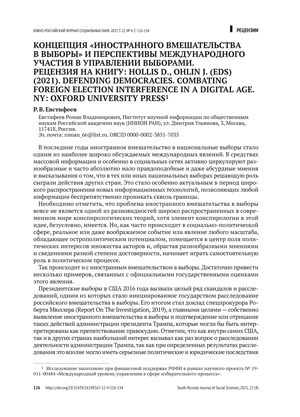Abstract
This article reviews the book "Defending Democracies. Combating Foreign Election Interference in a Digital Age”. The topic of foreign interference in national elections has become very acute in recent years, it is addressed both by political figures and the media, including this topic is actively discussed in social networks. However, the scientific study of this phenomenon has just begun. The article thoroughly analyzes the reviewed book, which is a collection of articles by more than 20 authors, in terms of goals and objectives, method and content of its 16 chapters. The article reviews in detail the main ideas and scientific findings of each chapter, provides a critical review of the methods and theories put forward and notes that, despite the prevalence of the legal approach, the authors have managed to combine the capabilities of both legal, historical and political sciences. The analysis of the articles placed in the book allowed to identify five promising areas of future research: cognitive research, information direction, study of domestic legal and political conditions, study of the norms of international law, study of mechanisms of response to illegal forms of foreign elections interference.
It is noted in the article that the authors of the book left out of their study the issue of correlation of foreign elections interference with international efforts to create a system of assistance and control in the field of elections. Although this topic is fundamentally important for assessing the prospects of international influence on elections because of the growing threat to the openness of the electoral process and its further securitization.
The conclusion is that the reviewed book is the first scholarly attempt to address this topic and makes an important step forward in conceptualizing the concept of foreign interference in elections.
Funding information
The study was supported by the Russian Foundation for Basic Research under scientific project No. 19-011-00484 “International level of management in the field of the electoral process”.
References
Гришин, Н.В. (2021). Политика государств в отношении международного наблюдения за выборами. Политическая экспертиза: ПОЛИТЭКС, 17(2), 150–162. DOI: 10.21638/spbu23.2021.203
Евстифеев, Р.В. (2021). Между помощью и вмешательством: оценка перспектив международного участия в управлении выборами в цифровую эпоху. Ученые записки. Научно-практический журнал, 4(40), 14–18.
Специальный доклад по итогам президентских выборов в Российской Федерации (2018 г.) с точки зрения покушений на российский электоральный суверенитет (2018). Временная комиссия Совета Федерации по защите государственного суверенитета и предотвращению вмешательства во внутренние дела Российской Федерации. Режим доступа http://council.gov.ru/media/files/2uQuCAAwoWu0B8tiDeDExn5x9CtBkTDV.pdf
Hollis, D., Ohlin, J. (Eds) (2021). Defending Democracies. Combating Foreign Election Interference in a Digital Age. DOI: 10.1093/oso/9780197556979.001.0001
Report on the Investigation into Russian Interference in the 2016 Presidential Election. (2019). U.S. Department of Justice. Retrieved from https://www.justice.gov/archives/sco/file/1373816/download


